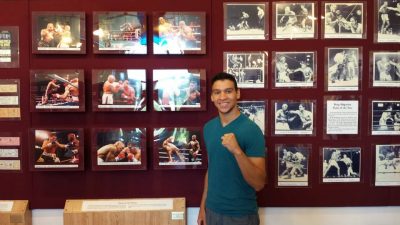In this new series, the Neag School will be catching up with students, alumni, faculty, and others throughout the year to give you a glimpse into their Neag School experience and their current career, research, or community activities.

Recent Neag School alum Josué Lopez ’15 MA will be returning this fall as a Ph.D. student and as part of the second cohort of Dean’s Doctoral Scholars at the Neag School. The program provides full tuition for four years plus a stipend to promising Ph.D. candidates. Dean’s Doctoral Scholars have the opportunity to conduct interdisciplinary research with leading experts in the field of education while earning a doctoral degree from UConn in curriculum and instruction, educational leadership, or educational psychology. For more information about the Dean’s Doctoral Scholars program, visit s.uconn.edu/neagdds.
Hometown: I was born in Dorchester, Mass., and my parents are both from Honduras. I then moved to western Massachusetts and lived in South Hadley and Holyoke.
Where were you working previous to Neag School? I worked for Windham (Conn.) Public Schools as a second-grade teacher, a sixth- to eighth-grade New Arrivals Teacher, and a ninth- to 12th-grade bilingual/ESOL teacher.
What appealed to you about the Neag School and/or the Dean’s Doctoral Scholar Program? I completed my master’s degree with Dr. Rojas and Dr. Reyes in their MATHLEAD program here at UConn. I want my doctoral studies to be something meaningful to the community that I serve. UConn’s Neag School of Education makes a commitment to working in the surrounding areas and, with Willimantic 20 minutes away, this seemed like a great opportunity.
What are your research interests? My research interests lie in the development of consciousness and its connection to both formal and informal education. I want to consider particularly how linguistic and cultural development impact the perception of the world, which ultimately impact the way we interpret academic tasks — i.e., critically analyzing literature and problem-posing/solving education (Freire).
What do you hope to ultimately achieve in pursuing your doctoral research into these particular areas of focus at the Neag School? My hope is to identify components of alternative systems of both formal and informal education so that historically marginalized and underserved communities have access to the same opportunities as more advantaged groups. By looking specifically at markers of oppression (race, socioeconomic status, gender, sexual orientation, language) and thinking about these as the foundation of educational movements and assets to develop in educational settings, we can create alternative/dual systems which serve the needs of all students.
“I was the first U.S. citizen in my family, the first high school graduate, the only college graduate, the only to receive my master’s, and now the only to become a doctoral student. … Being a Dean’s Doctoral Scholar means responsibility.”
What does it mean to you to be named a Dean’s Doctoral Scholar? I was the first U.S. citizen in my family, the first high school graduate, the only college graduate, the only to receive my master’s, and now the only to become a doctoral student. I have been incredibly fortunate to have had the opportunities which led me to this point. Being a Dean’s Doctoral Scholar means responsibility. I have a responsibility to act in service of those who did not receive the same opportunities that I did.
Describe your proudest career moment. My proudest career moment happens every time that I think about how much growth my students made not only academically, but also socioemotionally in our time together. Whether it is my student learning to read in Spanish for the first time as a 15-year-old or supporting an incredibly bright student in the United States who is separated from her family in Mexico for a better life, I can confidently say that my students are the best humans to ever grace my life with their presence.
On that same note, though, the toughest moments in my career are when I think of the incredible obstacles that lie ahead for my students and the limited resources available to them in this journey. It fills me with a sense of urgency that, though we can be proud of the work we do, we must understand that there is always more to be done.
What are your hobbies? I am a boxer and a mixed martial artist. I continue to coach back in the gym where I began training in Massachusetts three days a week. I enjoy many outdoor activities, but have to cover myself in bug spray because mosquitoes and I have a difficult relationship!
When do you find yourself at your happiest? I am at my happiest when, after a long day, I can reflect on what I did that day and know that I did it well. It is important to me that I always am my best self for others and for myself.
Tell me something that most people don’t know about you. Most people do not know that I am a three-time All-American, two-Time National Champion, and New England Golden Gloves Champion in boxing. The people who know me professionally have a difficult time picturing me in a fight!
Josué recently returned from Honduras, where this summer he trained bilingual educators at a new community school. Check out this video, featuring the work Josué and his colleagues achieved there.
 Facebook
Facebook
 Twitter
Twitter
 LinkedIn
LinkedIn
